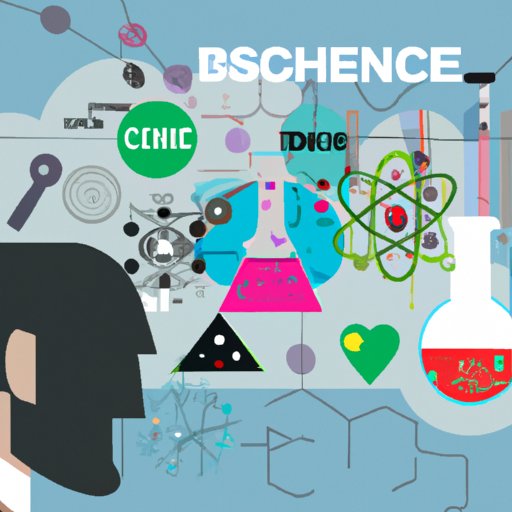Introduction
Science is a broad field encompassing the systematic study of the structure and behavior of the physical and natural world through observation and experiment. It involves examining phenomena, collecting data, forming hypotheses, testing theories, and developing new technologies.
From gaining a better understanding of the natural world to discovering new technologies and innovations, there are many benefits to studying science. In this article, we will explore why it’s important to pursue a scientific education and how it can enrich your life.
To Gain a Better Understanding of the Natural World
Scientific knowledge can provide insight into natural phenomena and help us understand the complexity of the world around us. From understanding the Earth’s climate patterns to learning about the evolution of species, scientific understanding provides answers to some of life’s greatest mysteries.
This knowledge can also be used to develop solutions that improve the quality of life. For example, advances in medical science have enabled us to develop treatments for a variety of diseases, while advances in agricultural science have allowed us to produce food more efficiently. By studying science, we can gain a better understanding of how the natural world works and use this knowledge to create a better future for ourselves and those around us.
To Develop Critical Thinking Skills
Scientific inquiry encourages critical thinking skills, such as analyzing data, questioning assumptions, and formulating hypotheses. These skills are essential for making informed decisions in life, as well as for pursuing further education or research in any field.
By honing these skills through the study of scientific concepts, students can learn to think more deeply and critically about the world around them. This can help them become better problem-solvers and more effective communicators, both of which are valuable assets in the modern world.

To Discover New Technologies and Innovations
The pursuit of scientific knowledge can lead to advances in technology that have a profound impact on our lives. For example, the invention of the telephone and the Internet revolutionized communication, while advances in biotechnology have enabled us to develop new medicines and treatments. By exploring the potential of science, we can uncover new ways to make our lives easier, healthier, and more efficient.
Technological innovations have also had a major effect on the global economy, creating new industries and jobs, and transforming existing ones. From telemedicine to self-driving cars, technological advancements have changed the way we live, work, and play, and these changes show no signs of slowing down.
To Expand Career Opportunities
A background in science can open up a wide range of career paths, from medicine and engineering to research and teaching. Many employers value scientific knowledge and look for candidates who possess it when filling positions. A scientific education can also provide an edge when applying for scholarships or grants, as well as when seeking admission to universities.
Examples of careers that require a scientific education include doctors, nurses, pharmacists, chemists, biologists, physicists, computer scientists, and meteorologists. By studying science, you can gain the skills and knowledge necessary to pursue a fulfilling and successful career in any of these fields.
To Foster Creativity and Problem-Solving Skills
Studying science encourages creative thinking and allows students to explore the possibilities of their own minds. It also helps them develop problem-solving skills, as they must often find creative solutions to the challenges posed by scientific experiments and projects.
These skills can be incredibly useful in everyday life, from solving practical problems to coming up with innovative ideas. By honing their creativity and problem-solving abilities through scientific study, students can gain a greater understanding of the world around them and become better equipped to handle the obstacles they may face in the future.

To Learn About the Universe and Its Complexities
Understanding the universe can give us a greater appreciation for our place in it. Through scientific exploration, we can uncover the secrets of the cosmos and gain insight into the vastness and complexity of the universe.
From studying the stars and galaxies to learning about the formation of planets, scientific exploration can reveal the mysteries of the universe and provide us with a deeper understanding of our place in the grand scheme of things.

To Explore the Potential of Science to Improve the Human Condition
Scientific research has the potential to solve global issues and improve the lives of people around the world. From developing cures for diseases to finding ways to reduce poverty and hunger, science can be used to address some of the most pressing problems facing humanity.
Advances in medical science, for example, have enabled us to treat a wide range of illnesses and diseases, while advances in agricultural science have helped us to increase food production and reduce hunger. By exploring the potential of science to make the world a better place, we can make a positive difference in the lives of people everywhere.
Conclusion
In conclusion, studying science can provide numerous benefits, from gaining a better understanding of the natural world to exploring the potential of science to improve the human condition. With its focus on critical thinking, problem-solving, and creativity, a scientific education can open up new career opportunities and expand our horizons. So, if you’re looking for a fulfilling and rewarding educational experience, consider studying science.
(Note: Is this article not meeting your expectations? Do you have knowledge or insights to share? Unlock new opportunities and expand your reach by joining our authors team. Click Registration to join us and share your expertise with our readers.)
